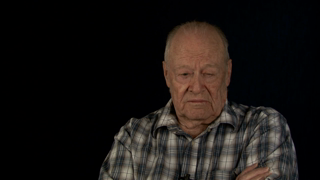5:58 | Frank Aiken found his Montagnard allies to be somewhat lawless and wild, though he says they were good fighters and they were lucky to have them. The enemy was everywhere, trying to get through the wire at night and taking potshots at them on the roads. He joined the locals for meals, though he says you couldn't be sure what you were eating.
Keywords : Frank Aiken Montagnard Special Forces Vietnam Vietnamese sapper Viet Cong (VC) mine indirect fire warlord village monkey rat dog Perforated Steel Planking (PSP) mortar

His first stop in Vietnam was the "Repo Depot," the replacement center where your assignment would be decided. They sent Frank Aiken to an artillery battery near Bong Son in support of a Special Forces group and a Montagnard civil defense force. In addition to the big guns at the base, they had mobile weaponry to protect them on the roads.
Back in a Stateside assignment after his first tour in Vietnam, Frank Aiken knew it wouldn't be long before he was sent there again. He was a veteran sergeant and they were sorely needed. In a headquarters battery the second time instead of a firing battery, he saw much less combat. The snakes were just as poisonous, however, and the rats just as aggressive. And latrine duty is eternal.
Vietnam was an experience he will never forget, says Frank Aiken, and he hopes we never have another situation like it. Thirty five years old when he deployed on his first tour, he thought it would not affect him like it affected younger soldiers, but it did. Back home amid widespread hostility to soldiers, he was still in the Army and had two more stops in his career.
Frank Aiken joined the Army to go fight in Korea, but the Army wouldn't cooperate. They tried to get him to stay on as an instructor and then they sent him to Germany. Disillusioned, he left the service after that tour. But he rejoined and finally made it to Korea as a post-war advisor. After two tours there and another in Germany, he would taste combat in Vietnam.